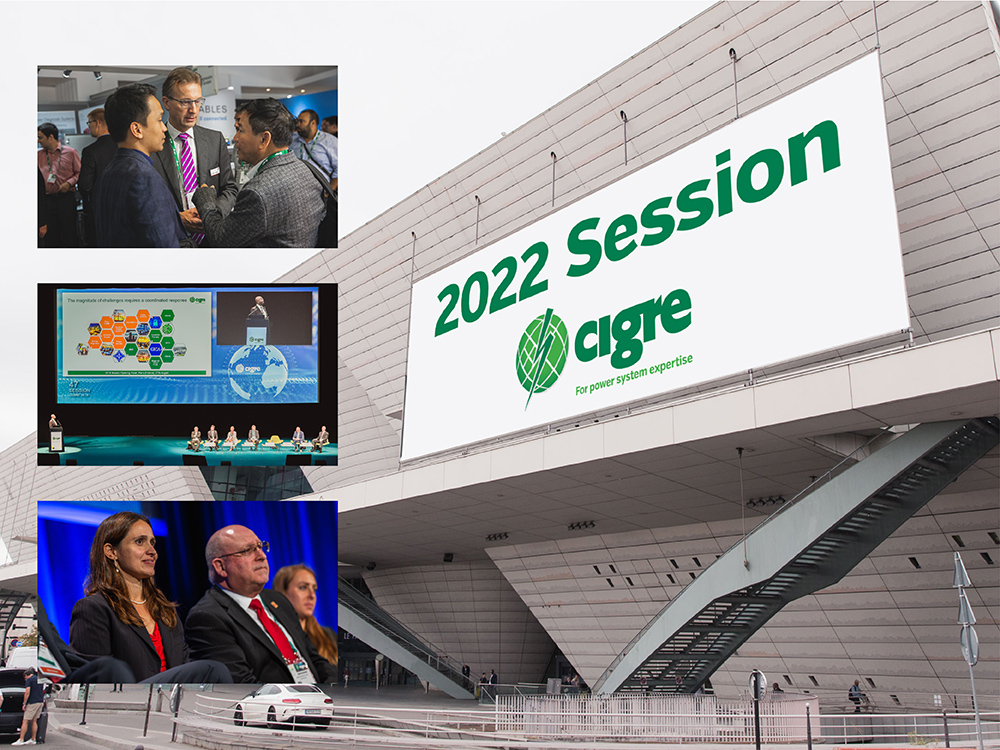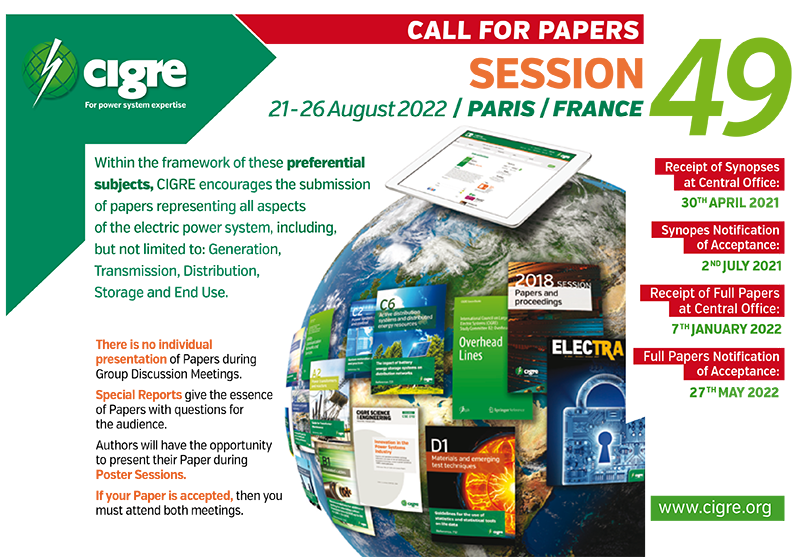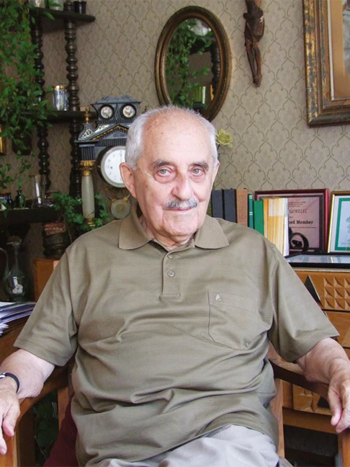CIGRE Session 2022 - Call for papers
28 August - 2 September 2022 - Paris - France

Within the framework of these preferential subjects, CIGRE encourages the submission of papers representing all aspects of the electric power system, including, but not limited to: Generation, Transmission, Distribution, Storage and End Use.
There is no individual presentation of Papers during Group Discussion Meetings.
Special Reports give the essence of Papers with questions for the audience.
Authors will have the opportunity to present their Paper during Poster Sessions.
If your Paper is accepted, then you must attend both meetings.
Download
Preferential Subjects
PS1: Generation mix of the future
- Impact and effect of increasing renewable power mix on new and existing generators, generator auxiliaries and motors,
- Synchronous compensator and high inertia machine design and performance for supporting power generation networks,
- Adaptation of international standards for electrical machine design & performance to current power grid requirements.
PS2: Asset management of electrical machines
- Experience with refurbishment, replacement, conversions, power up-rating and efficiency improvement of generators,
- Novel techniques to overcome known operational and design problems,
- Optimised condition monitoring, diagnosis, prognosis and maintenance practices to improve reliability and extend operational life of conventional plant and in new volatile grid conditions, including data handling and digital modelling.
PS 3: Developments of rotating electrical machines and operational experience
- Latest design, specification, materials, manufacture, maintenance and performance and efficiency improvements,
- Operational experience: Failures, root cause analysis, recovery options, cost and time reduction initiatives,
- Evolution and trends in designs of rotating electrical machines for renewable generation.
PS1: Experience and new requirements for transformers for renewable generation
- Operational experience: problems, maintenance, condition assessment, monitoring , failure rate, lifetime, lessons learnt,
- Design, test, insulation, monitoring, maintenance of step-up, secondary substation and DC converter transformers,
- Design and operational requirements for future applications: wind and photovoltaic.
PS2: Beyond the mineral oil-immersed transformer and reactors
- Alternative technologies for improved safety and environmental performance: gas-insulated, ester-immersed, dry-type and solid-state transformers,
- Operational experience with transformers using these new technologies,
- Advantages and limitations, impact on specifications, high temperature applications, business cases.
PS3: Best practices in transformers and reactors procurement
- Return of experience: factory qualification, design reviews, implementation of new specifications, on-site vs virtual witnessing,
- Quality control and testing: manufacturing check points, sub-supplier qualification, validity period for type tests, enhancements to standards, special tests, short-circuit test, paper DP measurement,
- Dealing with non-conformities, performance guarantees, warranty.
PS1: Decentralisation of T&D equipment
- New assets: e.g. DC switching equipment, fault current limiter,
- Influence of system changes on existing and new equipment,
- Equipment resilience against natural disasters.
PS2: Decarbonisation of T&D equipment
- SF6 Alternatives for MV and HV application and HV vacuum application,
- Life cycle management and the impact on the design of T&D equipment,
- Health, Safety and Environment aspects of T&D equipment.
PS 3: Digitalisation of T&D equipment
- Advanced sensors, non-conventional instrument transformers, monitoring and condition assessment,
- Digital twin and equipment reliability modelling,
- Pandemic influence on equipment.
PS 1: Learning from experiences
- Design, manufacturing, installation techniques, maintenance and operation,
- Quality, monitoring, condition assessment, diagnostic testing, fault location, upgrading and uprating methodologies and relevant management,
- Lessons learnt from permitting, consent and implementation.
PS 2: Future functionalities and applications
- Innovative cables and systems, exploring the limits,
- Role and requirements of power cables in tomorrow’s grids,
- Prospective impacts from the Internet of Things, Big Data and Industry 4.0 on power cable systems.
PS 3: Towards sustainability
- Environmental challenges impacting current, planned and future cable systems,
- Safety considerations, cyber and physical security, including case studies,
- Projects and initiatives to promote access to affordable, reliable, sustainable distribution and transmission cable lines for all.
PS 1: Challenges & new solutions in design and construction of new OHL
- Design for reliability, availability, future climate parameters, more frequent extreme loads, design against theft, vandalism,
- AC/DC Hybrid Lines, multi-purpose utilization (e.g. renewables, telecommunication),
- OHL challenging construction projects: multiple circuits lines, high towers, long spans, heavy wind and ice, high altitudes, geology, access to site, no proper machinery, long lines and variation in reliability criteria etc.
PS 2: Latest Techniques in asset management, capacity enhancement, refurbishment
- Preparedness and countermeasures for natural disasters and other emergencies,
- Decisions of replacement based on monitoring, maintenance, operation, historical data,
- Strengthening of existing lines to improve reliability, ampacity, lifespan.
PS 3: Environmental and safety aspects from OHL (joint PS with C3)
- Safety of workers in construction and maintenance of lines (equipment, methods, etc.),
- Reducing environmental impacts from new and existing OHL,
- Innovative engineering solutions/design to deal with environmental challenges.
PS1: Increased impact of clean energy transition on substation design
- On-offshore wind, PV, geothermal, etc.,
- Energy storage, hydrogen, synchronous compensators, etc.,
- GIS/GIL application for DC network.
PS2: Sustainability management challenges in substations
- External drivers for substation intervention such as resilience, reliability, security of supply, life expectancy coordination, etc.,
- SF6 alternatives and emission management, circular economy of materials such as reuse, reduce, recycle,
- New set of skills for new technologies, knowledge transfer and high standards of education in engineering skills.
PS 3: Integration of intelligence on substations (Joint PS with B5)
- Data analytics, remote supervising & monitoring and autonomy application,
- IoT and machine learning applications based on protection automation and control data including asset management, monitoring and data analysis,
- Expectations and benefits from digital substation, IEC 61850 Principles and applications to substations.
PS1: HVDC systems and their applications
- Planning and implementation of new HVDC projects including need, justification, design, integration of renewables, environmental and economic assessment,
- Application of new technologies including cyber security and advanced controls to address emerging network issues, DC grid, multi-terminal HVDC and hybrid HVDC systems,
- Refurbishment and upgrade of existing HVDC systems, service and operating experience of converter stations including offshore converters, and implication on converter equipment resulting from the conversion of ac circuits to dc circuits.
PS2: DC for distribution systems
- New concepts, technologies and designs of DC converters for distribution systems.
PS 3: FACTS and Power Electronic (PE)
- Planning and implementation of new FACTS and other PE devices including need, justification, for integration of renewables, environmental and economic assessment,
- Application of new technologies in FACTS and other PE devices including interfacing generation and storage to the network,
- Refurbishment and upgrade of existing FACTS and other PE devices, service and operating experience.
PS 1: Addressing protection related challenges in network with low-inertia and low fault-current levels
- Asset protection challenges and system protection challenges,
- Protection schemes: best practices, role of grid codes and impact of inverter characteristics and specifications,
- New asset protection principles, advancements in inverter technologies, system monitoring and state estimation for aiding asset and system protection.
PS 2: Applications of emerging technology for protection, automation and control
- Virtualization; digital twins, protection automation and control functions independent of hardware, centralized protection systems,
- New protection principles and monitoring principles for AC and DC grids including use of new sensors and better use of today’s sensors and process interfaces.
PS 3: Integration of intelligence on substations (Joint PS with B3)
- Data analytics, remote supervising & monitoring and autonomy application,
- IoT and machine learning applications based on protection automation and control data including asset management, monitoring and data analysis,
- Expectations and benefits from digital substation and IEC 61850 principles and applications to substations.
PS1: System transition resilience & asset management response
- Resilience metrics and measures to safeguard stakeholder value through grid forming, power electronics control, smart load shedding, fast restoration,
- Response to unexpected emerging system and business risks during the energy transition,
- New standards (equipment design and system planning) for resilient and life-cycle sustainable system.
PS2: Energy Sector Integration and tackling the complexity of multi-faceted network projects
- Energy sector integration, hydrogen & power-to-gas, deep electrification: technical and economic aspects,
- Multi-purpose, multi-terminal, multi-actor, multi-jurisdiction grid projects: how to tackle their planning complexity,
- Including in the planning process the flexibility options from non-network-assets and non-electric solutions (storage, virtual power plants, DR, energy communities, behind-the-meter resources).
PS3: Planning under uncertainty and with changing external constraints
- Modelling the impact of environmental conditions, technical advancements, greater stakeholder involvement, generation fleet shift, new type of contingencies, use of data driven network methods for long-term load forecasting, including impact of COVID pandemic on load profiles, planning scenarios, investments patterns and assets’ maintenance schemes,
- Decision-making under pervasive energy policies: optimising economic vs environmental benefits for consumers and matching centralized energy targets with private driven investments,
- Leveraging the evolving system services, market products and load profiles to optimize investment and timing, avoiding stranded assets (also from fossil plants dismissal).
PS1: System control room preparedness: today and in the future
- Operator training, situational awareness and decision supporting tools,
- Effective and efficient use of synchro-phasor data in power systems operation,
- Advanced and intelligent methods applied to power systems operation.
PS2: Operational planning strategies, methodologies and supporting tools
- High share of grid-connected and distributed power electronic interfaced resources including hybrid AC-DC systems,
- Advanced and intelligent methods applied to power systems operational planning and day-ahead programming,
- Impact of low demand and other predictable extreme operating conditions.
PS1: Setting ambitious climate strategies in the energy sector
- Standards and methods used to define goals and carbon reduction pathways,
- Reasons for setting ambitious climate strategies and benefits resulting from them,
- Company internal and external challenges to commit to an ambitious climate strategy and possible solutions.
PS2: Biodiversity and the supply of electricity, renewables-based or not: risks, challenges, solutions and opportunities
- Showcase how biodiversity has been enhanced in a generation, transmission or distribution projects,
- Showcase how biodiversity has been accommodated in a generation, transmission or distribution projects,
- Highlight special measures or actions taken to protect biodiversity impacted by a generation, transmission or distribution project.
PS3: Environmental and safety aspects from OHL (joint with B2)
- Safety of workers in construction and maintenance of lines (equipment, methods),
- Reducing environmental impacts from new and existing OHL,
- Innovative engineering solutions/design to deal with environmental challenges.
PS 1: Challenges and advances in power quality (PQ) and electromagnetic compatibility (EMC)
- Modelling, measurement and assessment of PQ phenomena including emerging areas such as supra-harmonics, harmonic instability, geo-magnetically induced currents and other similar phenomena,
- Integration and application of advanced signal processing, artificial intelligence techniques and big data analytics for event diagnostics and system planning purposes such as hosting capacity or emission limit calculation,
- Impacts on equipment compatibility and immunity, and emerging mitigation approaches.
PS 2: Challenges and advances in insulation coordination and lightning research
- Insulation coordination practices for end-to-end power networks, including the effects of long lines, long cables and frequency dependent models,
- Development of insulation coordination in AC systems interfaced with power electronics based systems and devices, and the need for standardisation,
- Lightning evaluation of transmission and distribution systems covering new asset designs and extreme meteorological events.
PS 3: Challenges and advances in power system dynamics
- Modelling, analysis and validation of individual components and wide-area system interactions including system level protection schemes considering changing system dynamics,
- Impact of emerging technologies such as hydrogen and other storage devices, grid forming inverters and demand side management,
- Analysis of security and resilience of power systems having high share of grid-connected or distributed inverter-based resources including feasibility of providing system support such as black start, islanding, system strength and inertia.
PS1: The evolution of market design and regulation to integrate distributed energy resources
- Market design developments to facilitate the integration of new participants and renewable resources,
- The role of retail electricity markets in the promotion of behind the meter technologies,
- Innovative contracts/services between market participants and with customers/distributed energy resource owners.
PS2: Changes to markets and regulation to enhance reliability and resilience
- The lessons for markets and regulation from major system disturbances and social disruptions,
- Market designs for reliability and resilience in systems with high penetration of asynchronous and low inertia connected facilities,
- Markets to coordinate resources that are not responsive to demand or price.
PS 3: Working with innovation and disruption — preparing for the future
- Innovative approaches to markets and regulation to achieve energy policy targets and to include edge-of-grid activities,
- The design and structure of retail and wholesale electricity markets to support capital-intensive investments,
- Sector regulation and tariff design in the face of technological disruption, e.g. vehicle to grid, hydrogen and new forms of storage.
PS1: DER solutions and experiences for energy transition and decarbonisation
- Electric mobility charging systems configuration and operation,
- Demand response and intelligent load configuration for customer empowerment,
- Electrification of transportation, heat systems and industrial processes.
PS2: Innovative planning and operation of active distribution systems
- Aggregation and management platforms for active distribution systems with DER,
- Strategies and tools for DER integration, hosting capacity, congestion management,
and system service provision by DER, - Greening rural and green-field electrification, off-grid distribution and zero emission industrial systems.
PS 3: Aggregated DER for enhancing resilience, reliability and energy security of distribution systems
- Configuration of local energy storage systems for managing uncertainties,
- Coordination of multi-energy systems supported by state-of-the-art technologies including intelligent inverter controls,
- Individual AC and DC micro-grids, multiple micro-grids, virtual power plant and local energy communities’ control and network integration.
PS1: Testing, monitoring and diagnostics
- Testing and experience with non-standardized, composite and combined voltages,
- PD measurement under DC, rectifier and impulse stress,
- Requirements of systems for testing, monitoring and diagnostics.
PS2: Materials for electro technical purposes
- Ageing under electrical, mechanical & thermal stress (e.g. power electronics and semiconductors, load cycling, higher temperatures, compact applications, corrosion and radiation ageing, etc.),
- Functional properties of insulation materials & testing for validation,
- Materials for battery and charging devices.
PS3: Simulation tools partnered with measurement techniques
- Application and development of new multi-physical simulation methods,
- Digital twin for insulation components and insulation systems,
- Physical models and sensors.
PS1: The opportunities and challenges brought by emerging Information and Communication Technologies to Electric Power Utilities in their path to Digital Transformation
- IoT technologies and architectures in physical asset management,
- Artificial intelligence, big data and analytics tools to improve asset management in electric power utilities,
- Augmented and virtual reality technologies in electric power utilities and power plants.
PS2: Cybersecurity techniques, technologies and applications for securing critical utility assets
- Cybersecurity directives, supporting standards and certification schemes – experiences from electric power utilities worldwide,
- Cyber incident management and experiences in the implementation of security operation centres for electric power utilities,
- Impact assessment and mitigation strategies for cyber-attacks to power system operations. Studies and experiences in the integration of information and communication technology (ICT) network and cybersecurity simulators with existing power system analysis tools.
PS3: Meeting the demands of the modern utility and DER with an agile and resilient telecommunication network
- Supporting operation technology (OT) services and applications using current and next generation cellular (4G/5G) and IoT-based wireless technologies,
- Increasing efficiency and cyber security with the use of cloud-based techniques and intelligent networks including modern network management systems, network automation and service orchestration, network function virtualization (NFV) and software-defined wide area network (SD-WAN),
- Improving and maintaining reliability and resiliency of critical services including protection services using modern telecommunication techniques and technologies.
Acronyms
AC | Alternative current |
DC | Direct current |
DER | Distributed energy resources |
DP | Differential pressure |
DR | Demand response |
EMC | Electromagnetic compatibility |
GIL | Gas insulated line |
GIS | Gas insulated substation |
HV | High voltage |
HVDC | High voltage direct current |
ICT | Information and communication technology |
IoT | Internet of things |
MV | Medium voltage |
NFV | Network function virtualization |
OHL | Overhead line |
OT | Operation technology |
PD | Partial discharge |
PE | Power electronics |
PQ | Power quality |
PV | Photovoltaic |
T&D | Transmission and distribution |
SD-WAN | Software-defined wide area network |
SF6 | Sulphur hexafluoride |






